ChatGPT has taken the internet by storm over the last three months, with exciting as well as extreme reactions ranging from calling it an alternative to Google search to advocating its ban. In this blog, Aditya Sinha, Birendra Kumar and Debabrata Basu discuss the debate around this platform, its potential and its application in agricultural extension.
CONTEXT
In November 2022, the trending topic in the technology sphere was ChatGPT, launched as a testing model by the artificial intelligence (A.I.) research company, OpenAI. The topic is still viral, with new updates and advancements appearing in the field each day.
ChatGPT is a natural language interface that acts like a chatbot and interacts with its users (Williamson et al., 2023). It comes under the array of OpenAI applications popularly known as Large Language Models (LLMs) that can generate “human-like” content by processing a large quantity of information available on the web (Rettberg, 2022). Since the release of ChatGPT, there have been increasing debates worldwide on the disruption it may cause, with both positive and negative connotations. However, several users struggle to get across the platform because of acute pressure on the server. An estimate says that more than one million users have been trying to explore ChatGPT since its launch (Shankland, 2023).
The decade from 2020-2029 will be impacted mainly by LLMs. Since ChatGPT is currently behind in terms of access restrictions and server load issues, there are a few alternatives (Table 1) such as Sphere, Bloom, PaLM, etc., which could be of great use in education (Devansh, 2022).
Table 1. A list of applications/ alternatives to ChatGPT.
| Tool | Parent company | Striking features |
| PaLM (Pathways Language Model) | Better distinction between cause and effect, conceptual combination suited to the context | |
| Sphere | Meta | Verifies citations, suggests alternatives in a better way |
| Bloom | BigScience | Promotes free research, amalgamation of same-context research |
| Galactica | Meta | Explains math formulae, helps write papers, creates Latex |
| Open Pretrained Transformer, or OPT | ArXiv | Energy efficient, detects hate speech more efficiently. |
MAJOR DEBATES AROUND OPENAI AND LLM
The effect of OpenAI on education is a hot topic of debate. Some believe that it may lead to the loss of creativity among students by being able to generate assignment articles, codes and solving numerical problems. It was well documented recently that ChatGPT cleared the final examination for MBA at Wharton School in the United States. It was also successful in clearing the Google Coding Interview for Level 3 engineers. Although, it failed to clear the Civil Services examination conducted by the Union Public Service Commission (UPSC) in India and the examination designed for sixth graders in Singapore (Bordoloi, 2023). This underlines the grave threat to trust issues while using such platforms in education.
Secondly, it is difficult to detect plagiarism in automated text generated through ChatGPT. Most educators believe that they will have to struggle with plagiarism in assignments since major software fails to detect it. Also, some educators believe that the way students are taught should be changed, so that there is no recourse to shortcuts like ChatGPT.
Another group of thinkers believe that ChatGPT has the potential to enhance creativity since humans can only perform tasks that machines cannot. This will lead to the exploration of the full human potential in the true sense. The proponent of this theory strongly believes that the force behind platforms such as ChatGPT, called “Generative A.I.” (Generative Artificial Intelligence), is nothing but an artificial brain fed with loads of data. It can generate novel content using iterations. However, the flip side lies in the fact that the content produced is not always correct since the platform cannot apply human-like understanding or intelligence (Holeiciuc, 2023), which is why it cannot replace humans but can help them perform better.
Lastly, a group of organizations and researchers wants governments worldwide to ban all such technology altogether. Though a blanket ban requires legislation and complex procedures, it was seen that many tech companies had to withdraw similar applications because of criticism from different sections of society. An example is Galactica (parent company Meta/ Facebook) which survived online only for three days. It was an LLM built as a large model for science trained on over 48 million articles, websites, textbooks and lecture notes. The company claimed that it had the potential to summarize academic papers, solve mathematical problems, assist in coding and so on. Soon after the launch, scientists started pointing out the application’s flaws and incorrect results, leading the company to recall the same (Heaven, 2022). The recall from such a large tech company in just three days points to bitter competition between the companies to launch the product to gain the first mover advantage. Companies are skeptical that other companies may launch a similar product if they are late to the game. No wonder, earlier in 2021, Google had already proposed a similar chatbot that could enhance accessibility of information among students (Williamson, 2021).
POTENTIAL OF ChatGPT
The immense potential of ChatGPT can be judged by its ability to adapt to a conversation in progress and respond to specific messages (Analytics Insight, 2022). Over time, as the system continuous to interact with the user, the messages become better to a greater degree. In addition, it has immense potential to offer better customer service by answering customer queries more effectively. Information Technology professionals are using ChatGPT in writing code, product descriptions, translation, etc. Another significant scope of the application is in content creation by writing social media posts, designing promotional texts, video scripts, among others (Visagie, 2023). Hence ChatGPT and similar tools are powerful language models with the potential to revolutionize how people interact with machines.
APPLICATION OF ChatGPT IN AGRICULTURAL EXTENSION
ChatGPT is useful in agricultural extension through the creation of chatbots for solving farmers’ problems concerning crop production, marketing, disease management, etc. It also has the potential to provide customized recommendations to farmers for better decision-making. Farmers can also be assisted by capturing pictures of disease infestation in plants and getting responses on the go. A virtual assistant can also be created for providing stepwise information to farmers on a wide range of topics on farming practices. In addition, ChatGPT can be used to support agricultural extension by developing specific educational content that is a mix of articles, videos and graphics (Enablers of Change, 2023). Apart from this, it could be useful in precision agriculture through the collection and analysis of data from various sources on crop monitoring. Monitoring livestock and crops can also be easily carried out using this tool, enabling the detection of early signs of disease and the taking of precautionary measures. Furthermore, automation of manual tasks in the field, such as planting, harvesting and irrigation management could also be successfully practised (Janzen, 2023).
DEMONSTRATION OF ChatGPT IN AGRICULTURAL EXTENSION
The user interface of ChatGPT makes sure that the user goes through the examples, capabilities and limitations of the platform before posing a question.
As far as agriculture is concerned, the tool looks quite promising in areas where it is fed with good training data. However, it is not intelligent enough to replace human beings, particularly in advisory services and extension outreach. An exciting feature of ChatGPT is that it remembers the previous chat thread and can provide follow-up corrections, as mentioned in Fig. 1.
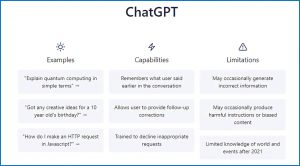 Figure 1. Example of ChatGPT’s user interface with its capabilities and limitations (https://chat.openai.com/chat)
Figure 1. Example of ChatGPT’s user interface with its capabilities and limitations (https://chat.openai.com/chat)
On trying to chat with the bot with a simple question, “How to control aphid infestation in mustard in Bihar?”, the responses mentioned (Fig. 2) were quite generic, with a focus on cultural methods of control like the introduction to natural enemies, use of insecticidal soap, application of neem oil, etc. Nevertheless, the responses are appreciable from the point of view of the environment and nature. A follow-up question was asked: “Chemical control for aphids in mustard in Bihar?”. Again, the responses were generic with little information on the exact dosage of the chemicals (Fig. 3). Also, it is worth mentioning that the tool advised to consult an extension officer or qualified agronomist before applying the chemical control. Due to space constraints, it is not possible to mention the other follow-up questions, but the reliance on extension agents was found to be a major limitation.
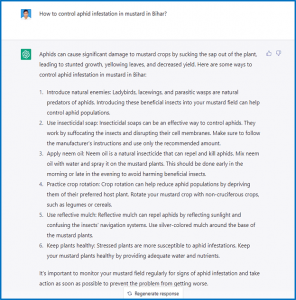 Figure 2. Question and answer interface of ChatGPT (personal conversation on agricultural advisory).
Figure 2. Question and answer interface of ChatGPT (personal conversation on agricultural advisory).
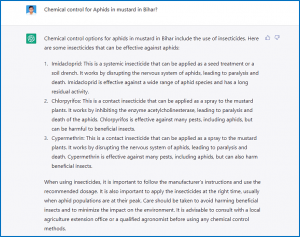 Figure 3. Follow-up question to check specific advisory on ChatGPT.
Figure 3. Follow-up question to check specific advisory on ChatGPT.
Chat GPT: Concerns in agricultural extension:
Agricultural research centers and state agricultural universities play an important role in updating scientific information on the cloud, through online sources like websites, web portals, databases, advisories through geolocation tagging for reliable advisory services to farmers. This will lead ChatGPT to provide more reliable advisories when sought by farmers or other stakeholders. Given that Indian institutions are not prudent in uploading useful/scientific information, initiatives such as the e-gyankosh https://egyankosh.ac.in/, krishiprabha, etc., which are national digital repositories, can address this issue.
ChatGPT can provide a solution sourced from millions of repositories and materials available online. However, its efficiency depends on the quality of the repository too, which is uploaded by humans. So there must be checks and balances in the uploading process. Extension advisories are very much dependent on customized information. In this context, extension professionals will need to put effort into understanding agriculture’s dynamic nature before referring the ChatGPT solutions to farmers. The role of extension professionals will therefore involve adding the human dimension to advisories, which such technology platforms cannot.
LIMITATIONS OF CHATGPT
The knowledge of ChatGPT is limited to 2021 data. It can’t exclusively obtain information from a specialized source since the data is churned from the cloud. Its beauty lies in the ability to churn data from different sources and produce mostly unique replies (paraphrased) to the same question. If we rely on ChatGPT to gather information from a specific source , it is no better than any expert system or mobile application with limited information. While it can fill the gap of limited staff by providing a comprehensive source of information to users, it is left to the discretion of the user to harness the potential of this technology in the best possible way and exercise caution before putting the knowledge to use.
CONCLUSION AND INSIGHTS FROM RECENT DEVELOPMENTS
The popularity of ChatGPT is evident from the current hype around it. In agriculture, it is a blessing for farmers to get valuable real-time insights on crops without having to depend on extension agents for minor issues. However, a significant limitation of such models is the inability to understand cause-and-effect relationships, leading to the dependence on human-generated information. Thus, it is crucial for farmers not to solely rely on technological solutions suggested by ChatGPT but instead use their understanding and cognitive knowledge and take the help of a human expert before rushing to decision-making. It will also facilitate the creation of draft content for different agricultural websites, portals, blogs, wiki, etc., and in developing cues for creating improved apps in agriculture too, with less cost, time and limited human intervention.
Agricultural research centers and state agricultural universities throughout the country should strive to upload more advisories for farmers and data generated from the field online tagging the coordinates. It will enrich the credible knowledge pool on the cloud on which ChatGPT can work with more accuracy. This will help produce more reliable information through such technology platforms. The role of extension workers in the changing landscape will be to add a human dimension to validate such information to gain the trust of stakeholders. The ideal scenario would be specialized versions of ChatGPT in agriculture focusing on different agro-climatic zones of the country to make it more reliable and trustworthy in the long run. The coming years will see several iterations of the technology in agriculture, potentially disrupting how farming is practiced currently.
REFERENCES
Analytics Insight. (2022). 5 Potential use cases of ChatGPT. Retrieved from https://www.analyticsinsight.net/5-potential-use-cases-of-chatgpt/
Bordoloi, P. (2023). When ChatGPT attempted UPSC exam. Retrieved from https://analyticsindiamag.com/when-chatgpt-attempted-upsc-exam/
Devansh (2022). 5 Free ChatGPT competitors you should know about for 2023. Retrieved from https://medium.com/geekculture/5-free-chatgpt-competitors-you-should-know-about-for-2023-ff5fc48d0430
Enablers of Change. (2023). How enablers of change might use ChatGPT. Retrieved from https://www.enablersofchange.com.au/how-enablers-of-change-might-use-chatgpt/
Heaven, W.D. (2022). Why Meta’s latest large language model survived only three days online. Retrieved from https://www.technologyreview.com/2022/11/18/1063487/meta-large-language-model-ai-only-survived-three-days-gpt-3-science/
Holeiciuc, A.M. (2023). Will generative A.I. and ChatGPT take over human creativity? Retrieved from https://www.druidai.com/blog/chatgpt-to-take-over-human-creativity
https://chat.openai.com/chat
Janzen, T. (2023). What are five ways ChatGTP will revolutionize agriculture in the U.S.? Retrieved from https://www.agriculture.com/news/technology/what-are-five-ways-chatgtp-will-revolutionize-agriculture-in-the-us
Rettberg (2022). How to use ChatGPT to get past writer’s block. Retrieved from https://jilltxt.net/right-now-chatgpt-is-multilingual-but-monocultural-but-its-learningyour-values/
Shankland, S. (2023). Why we’re obsessed with the mind-blowing ChatGPT AI chatbot. Retrieved from https://www.cnet.com/tech/computing/why-were-all-obsessed-with-the-mind-blowing-chatgpt-ai-chatbot/
Visagie, B. (2023). Revolutionising technology: The game-changing potential of ChatGPT and GPT-3. Retrieved from https://integrove.com/the-potential-of-chatgpt-and-gpt-3/
Williamson, B., Macgilchrist, F., and Potter, J. (2023). Re-examining A.I., automation and datafication in education. Learning, Media and Technology, 48(1), 1-5.
Williamson, B. (2021). Google’s plans to bring AI to education make its dominance in classrooms more alarming. Retrieved from https://www.fastcompany.com/90641049/google-education-classroom-ai
 Aditya Sinha is Assistant Professor-cum-Junior Scientist (Sr. Scale), Department of Extension Education, Bihar Agricultural University, Bhagalpur, Bihar. He can be reached at email: inc.aditya@gmail.com
Aditya Sinha is Assistant Professor-cum-Junior Scientist (Sr. Scale), Department of Extension Education, Bihar Agricultural University, Bhagalpur, Bihar. He can be reached at email: inc.aditya@gmail.com
 Birendra Kumar is former Scholar-in-Residence at Dr. Rajendra Prasad Central Agricultural University, Pusa, Bihar. He has held the positions of Director, Residential Instruction-cum-Dean, Post Graduate Studies at Bihar Agricultural University, Sabour and full-time Professor in the Department of Agricultural Communications at GB Pant University of Agriculture and Technology, Pantnagar, Uttarakhand. He can be reached at email: birenk1953@gmail.com
Birendra Kumar is former Scholar-in-Residence at Dr. Rajendra Prasad Central Agricultural University, Pusa, Bihar. He has held the positions of Director, Residential Instruction-cum-Dean, Post Graduate Studies at Bihar Agricultural University, Sabour and full-time Professor in the Department of Agricultural Communications at GB Pant University of Agriculture and Technology, Pantnagar, Uttarakhand. He can be reached at email: birenk1953@gmail.com
 Debabrata Basu is Professor, Department of Agricultural Extension, Bidhan Chandra Krishi Viswavidyalaya, Mohanpur, Nadia, West Bengal. He can be reached at email: drdbasu@gmail.com
Debabrata Basu is Professor, Department of Agricultural Extension, Bidhan Chandra Krishi Viswavidyalaya, Mohanpur, Nadia, West Bengal. He can be reached at email: drdbasu@gmail.com


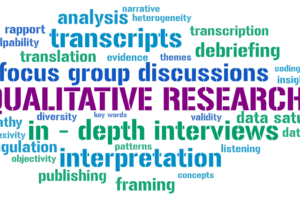
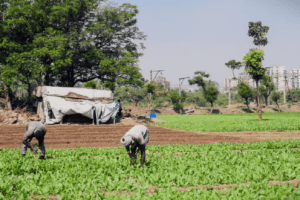

Thanks and congratulations to the authors and AESA for enlightening us in an emerging area. In the times when disruptions are appreciated for its importance in development, we cant ignore things like ChatGPT. Yes, any innovation has initial hiccups including resistance from some quarters, so is the case with ChatGPT. In extension often we say, location specific advisories or solutions fitting into location at micro level, for which local extension agents have relevance over ChatGPT. The quality in terms of richness and authenticity of content in repository would also matter in appropriateness of delivery by ChatGPT. It’s use in improving the language including finding catchy titles for the blogs makes it an exciting tool too! Enjoyed reading it, thanks!
As ChatGPT relies basically on the information available in the web, we cannot entirely rely on information available through it . Today accessing information is not a problem compared to its processing and delivering it in a manner which will be of use to the farmers. Like many other tools, this is also fraught with limitations like Information over load, conflicting information, wrong information, wrong instructions etc. which in fact make the job of an extension professional a little more complex in providing the reliable and required information to the farmers. What the farmers need is accurate, reliable and timely information which a competent extension professional can provide.
Despite its limitations, this platform helps the farming community to the extent of using it as a first aid. As the authors indicated its use depends upon the user and his ingenuity which majority of our farmers lack.
Thanks to the authors Aditya Sinha, Birendra Kumar and Debabrata Basu for providing details on this new communication tool. Thanks to AESA also for posting in the site.
“The blog on the use of Chat GPT is informative and interesting. This new tool particularly excels in performing repetitive tasks with accuracy. However, it’s performance and applicability in a sector like agriculture where more customization is demanded, needs to be scrutinized. Further, performance of such an AI based tool requires large amount of data to train the machine. Though its developers may be successful in doing so in their own context, it may not be relevant enough in our farming situations. As it is an open source platform, such a validation process is difficult to happen by the generous contribution by the domain experts. However, the tool has very potential to replace the generic experts in all domains in the near future”
Compliments to the authors and AESA for pioneering to ponder/debate over/flagging the public reactions/issues (as boon or bane) on the trending topic ChatGPT revolution, particularly its potential for application in agri.extension. Potentially, ChatGPT can generate “human like” content by processing a large quantity of information available on the web. But the Blog has ably flagged several issues connected with making ChatGPT evolve from generating “human like content” to “human content”. Towards this, as a useful follow up of this Blog, I feel immediate attention may be necessary to: the government/statistical/research system (SAUs, ICAR, etc.) should regularly engage in enriching the quantity and quality (checks and balances) of information on the web; strengthening the initiatives like e-gyankosh, krishiprabha, as well as empower ChatGPT to generate as much as “human content” so that better performance is possible; the Government should immediately act on relaxing the access restrictions and resolve server load issues so that users can get across the system easily and early besides promoting extensive research to make ChatGPT able enough to provide customized recommendations to farmers for better decision making besides relieving the extension system struggling with depleted staff ; the researchers also have to find out the availability, creativity loss, extent of plagiarism, efficacy of alternatives available to ChatGPT as discussed in the Blog; research is also needed to closely follow the ChatGPt conversation in progress, specific messages generated, interactions with the users for the correctness of the messages and follow up corrections as reflected in improved messages and finally attaining almost human content and maximum economic gain. Good Blog, well prepared, demands follow up.